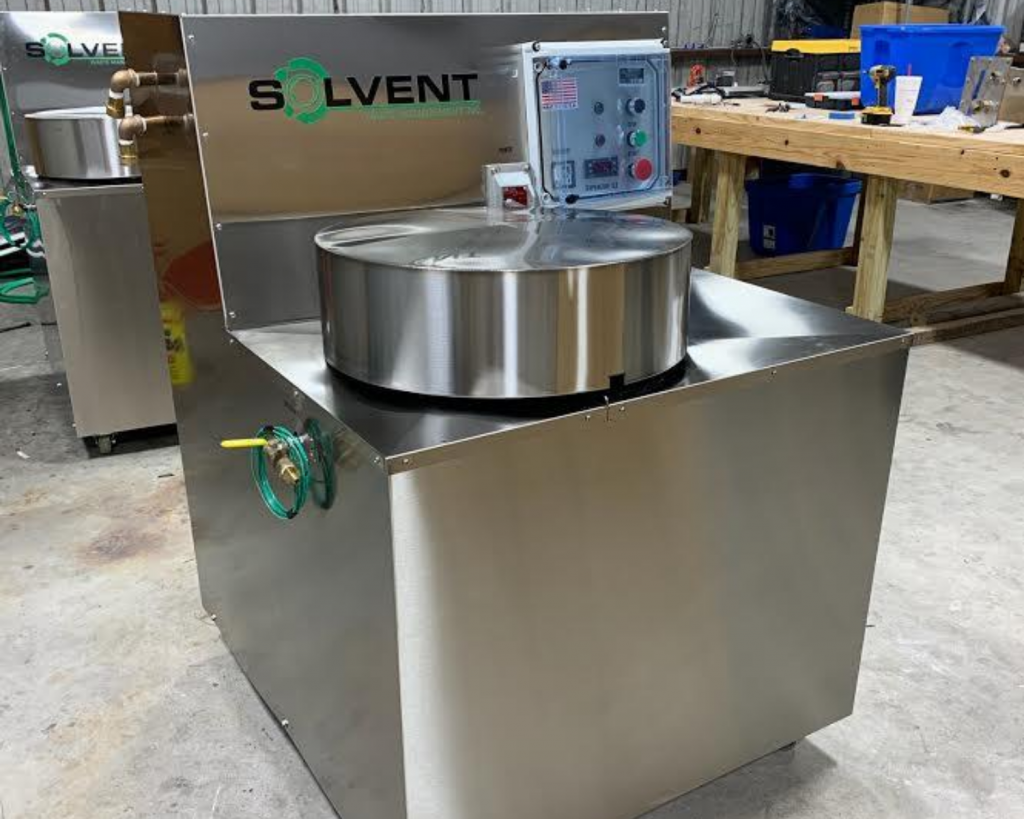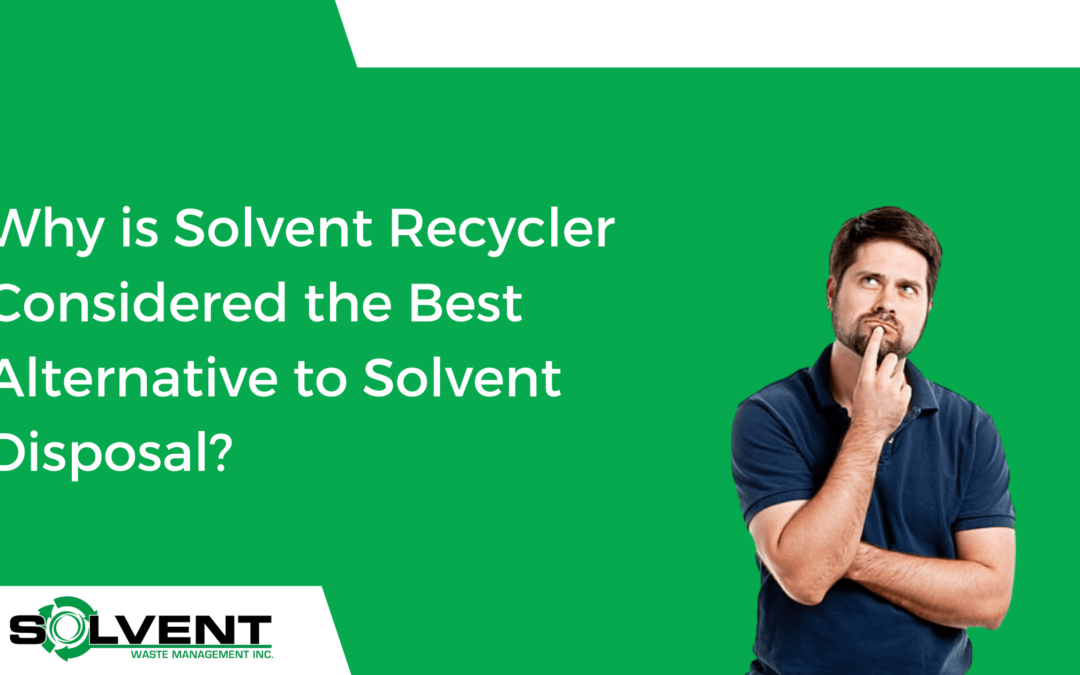What is Solvent Recycling?
Solvent recycling is the process of reclaiming used solvents from industrial processes, such as paint and ink production, metalworking fluids and cleaners. The solvents are separated from waste streams and reused instead of discarded.
Many solvent recyclers can reclaim up to 90% of a business’s solvent for reuse, significantly reducing the amount of hazardous waste generated.
Solvent recycling is a sustainable alternative to solvent disposal, offering a range of environmental, economic, and operational benefits for businesses.
In this blog, we will explore the various advantages of solvent recycling, as well as the process of solvent recycling and how businesses can choose the right solvent recycler.
The Challenge of Solvent Disposal
Solvents are widely used in various industries for cleaning, degreasing, and other purposes. However, improper disposal of solvents can lead to soil and water contamination, air pollution, and other negative effects.
Current methods of solvent disposal, such as incineration and landfilling, have significant drawbacks, including high costs and potential environmental harm. In order to address these challenges, businesses can turn to solvent recycling as a more sustainable and efficient waste management solution.
The Benefits of Solvent Recycler
Solvent recycling is the process of collecting and purifying used solvents so that they can be reused in various applications. The advantages of solvent recycling are many, including cost savings, reduced environmental impact, and improved operational efficiency.
By recycling solvents, businesses can significantly reduce waste disposal costs, avoid new solvent purchases, and reduce the environmental impact of their operations.
The Environmental Benefits of Using Solvent Recycler
Solvent recycling offers a range of environmental benefits, including reduced greenhouse gas emissions and other air pollutants. By minimizing the need for energy-intensive disposal methods, such as incineration and landfilling, businesses can significantly reduce their carbon footprint.
Solvent recycling can also help reduce water usage and protect natural resources by limiting the need for new solvent production. By implementing solvent recycling, businesses can demonstrate their commitment to sustainability and responsible waste management.
Recycling solvents can reduce the amount of hazardous waste going into landfills and waterways. It is also a great way to conserve resources, since reusing solvents eliminates the need for using more of the earth’s limited supplies.
Proper solvent recycling practices ensure the purity of recycled batches and reduce energy costs associated with manufacturing new products from raw materials. Furthermore, it decreases hazardous emissions from production processes, helping to create a healthier environment for us all.
These environmental benefits can add up quickly. It is estimated that reusing solvents instead of disposing of them saves thousands of gallons of fresh water each year, and can reduce emissions levels significantly. Recycled products are often cheaper and longer lasting than non-recycled counterparts, so companies and consumers alike benefit from recycling programs.
Additionally, implementing a proper solvent recycling program is good for the company’s reputation—consumers are conscious about the environment and interested in businesses that practice sustainable measures. Businesses with this type of green reputation stand to benefit from customers seeking out their products or services.
The Economic Benefits of Using Solvent Recycler
In addition to the environmental benefits, solvent recycling also offers significant economic advantages for businesses. By reducing the need for new solvent purchases and minimizing waste disposal costs, businesses can achieve significant cost savings.
Additionally, by ensuring a reliable supply of high-quality recycled solvents, businesses can improve operational efficiency and reduce downtime. Solvent recycling can also help businesses comply with environmental regulations and avoid potential penalties for non-compliance.
Benefits of Recycled As-New Solvents
Recycled solvents can be used in the same manner as new solvents, yielding the same results and quality of product at a lower cost. In addition to helping your business reduce expenses, recycled as-new solvents also allow you to reduce your environmental footprint and improve sustainability throughout your manufacturing process.
By reusing instead of disposing of, you are able to minimise waste materials, conserve resources and decrease hazardous emissions.
Solvent recyclers offer numerous advantages over traditional solvent disposal methods. For example, rather than having to pay for waste disposal services, your business can keep and reuse the solvent in-house indefinitely.
As an added bonus, recycling methods are typically more efficient and cost-effective than typical solvent disposal practices due to the ability to constantly re-use solvents multiple times before needing replacement materials.
In addition, recycled solvents usually require less energy consumption during processing than regular wastes, resulting in further cost savings.
For more information read our latest blog on Benefits of Solvent Recycler to Manage Industrial Solvent Waste
How Does Solvent Recycler Help Your Business?
Solvent recycling is beneficial for a number of reasons. Not only does it reduce the amount of hazardous waste generated from your business, but it also helps conserve resources and ultimately save you money.
Recycled solvents remove additional costs associated with disposal, saving time and money while allowing you to remain compliant with local ordinances. Additionally, solvent recyclers can customize services to address specific needs, providing cost-effective strategies that help improve your bottom line.
Solvent recycling can recycle a wide range of solvents, including lacquers, mineral spirits, and paints. This is advantageous to any business because it reduces the amount of disposal and helps eliminate potential hazards associated with solvent disposal. In addition, solvents can be recycled or re-purposed which allows businesses to reduce the consumption of new materials by preserving their existing supply.
By continuing to use these resources at a later time, businesses are able to save on costs without affecting product production quality and difficulty. Lastly, solvent recyclers have extensive safety protocols in place ensuring that your supplies are always recycled properly and no contaminants enter the cycle system.
How Does a Solvent Recycler Work?
When a solvent is required for industrial cleaning process equipment or related parts, the waste produced is a contaminated solution. The initial solvent, whether alcohol, acetone, or another cleaning liquid, and whatever substance was removed from the equipment, such as ink, paint, resin, grease, or oil, are combined in this solution.
Without solvent cleaning, the waste liquid must be stored until it can be disposed of correctly as a hazardous material or transported to a specialised recycling facility. Proper storage, transport, and disposal necessitate special procedures and capabilities, which can be an expensive part of the manufacturing process for many manufacturers.
Having an on-site solvent recycler allows businesses to cut costs and resources spent on this aspect of their operations. In-house solvent recycling significantly reduces the amount of hazardous waste that must be disposed of in a special manner. It also makes it simple to recover solvent for reuse, reducing the amount of virgin solvent required.
When you recycle your waste solvent with an on-site distillation unit, you always have control over which solvents come into contact with the equipment. Make sure to collaborate with top-notch technicians who can monitor your solvent recyclers in real-time to ensure they are operating at peak efficiency.
For more details read How Does Solvent Recycling Work? A Comprehensive Guide
Choosing the Right Solvent Recycler
Choosing the right solvent recycler is an important consideration for businesses looking to implement sustainable waste management practices. Businesses should evaluate factors such as the type of solvents being used, the volume of waste generated, and the desired level of purity for recycled solvents.
Additionally, it is important to evaluate the reliability and reputation of the solvent recycling equipment supplier, as well as the quality of technical support and customer service they provide. By working with a trusted and experienced supplier, businesses can ensure that they have access to the most effective and reliable solvent recycling equipment available.
Advantages of Reusing Solvents vs. Disposing of Them
Solvent recycling has many advantages when compared to regular solvent disposal. Reusing solvents instead of disposing of them allows you to reduce your hazardous waste output, as recycled solvents are used in a closed-loop system which does not produce any additional wastewater or harmful emissions.
Moreover, reusing solvents can help conserve resources, as no new material needs to be purchased and produced for you to complete your processes. Collectively, these benefits make solvent recycling the most cost-effective and environmentally conscious choice for industries looking to improve their sustainability practices.
In industries such as industrial cleaning or automotive repair, it can be difficult to mitigate the environmental and financial impacts of waste solvents. Solvent disposal can be expensive, due to the product costs and disposal fees incurred.
Additionally, disposing of large amounts of hazardous materials can generate negative environmental impacts in the form of water contamination, air pollution, and hazardous waste buildup.
Utilizing a solvent recycler helps industries save money on solvent costs while reducing their environmental footprint. By recycling solvents, you will not only reduce your bottom-line costs but also help protect the environment from further damage.
Do You Want to Know More About Recycling Solvent Waste?
Hazardous waste, which is typically generated by industry and manufacturing processes, poses a threat to any environment and human health if not handled properly. To reduce the negative effects on those around it, these types of waste require special handling in terms of how it is collected, stored, and transported.
This also means that businesses that generate recurring hazardous waste are under pressure to comply with regulations while also reducing operating costs in order to dispose of or recycle responsibly and in an environmentally friendly manner.
If your company or organization isn’t already recycling solvents, now is a good time to start. In many cases, the only change that businesses need to make is to switch to a waste solvent recycler that supports the reusing of solvents.
You may need to enter into a new service agreement with a different disposal company, but when all of the financial benefits are considered, the long-term return on investment (ROI) can be quite good.
Conclusion: The Importance of Sustainable Waste Management
In conclusion, solvent recycling is an effective and sustainable waste management solution that offers a range of environmental, economic, and operational benefits for businesses. By implementing solvent recycling, businesses can reduce waste disposal costs, avoid new solvent purchases, and improve operational efficiency.
Choosing the right solvent recycler is an important consideration, and businesses should carefully evaluate the various options available in order to find the best fit for their specific needs.
Ultimately, by adopting sustainable waste management practices, businesses can demonstrate their commitment to environmental responsibility and contribute to a more sustainable future for all.
About Solvent Waste Management
Since 1994, Solvent Waste Management, Inc. has assisted many companies in a variety of different industries not only improving their operations but also reducing costs.
Solvent Waste Management Inc. designs and manufactures solvent distillation equipment that cleans contaminated solvents, allowing users to restore and continuously reuse solvents – thereby saving money on the cost of disposal and the cost of new solvents.

Model SW8 Solvent Recovery System
Model SW30 Solvent Cleaning Machine
Model SW55 Solvent Recycler Machine
Model SW70 Solvent Recovery Equipment
Solvent Waste Management designs and manufactures solvent recycling equipment that cleans contaminated solvents in such a way that the customer can reclaim and reuse solvents again and again, thus saving on both the cost of solvent disposal and the cost of new materials.

